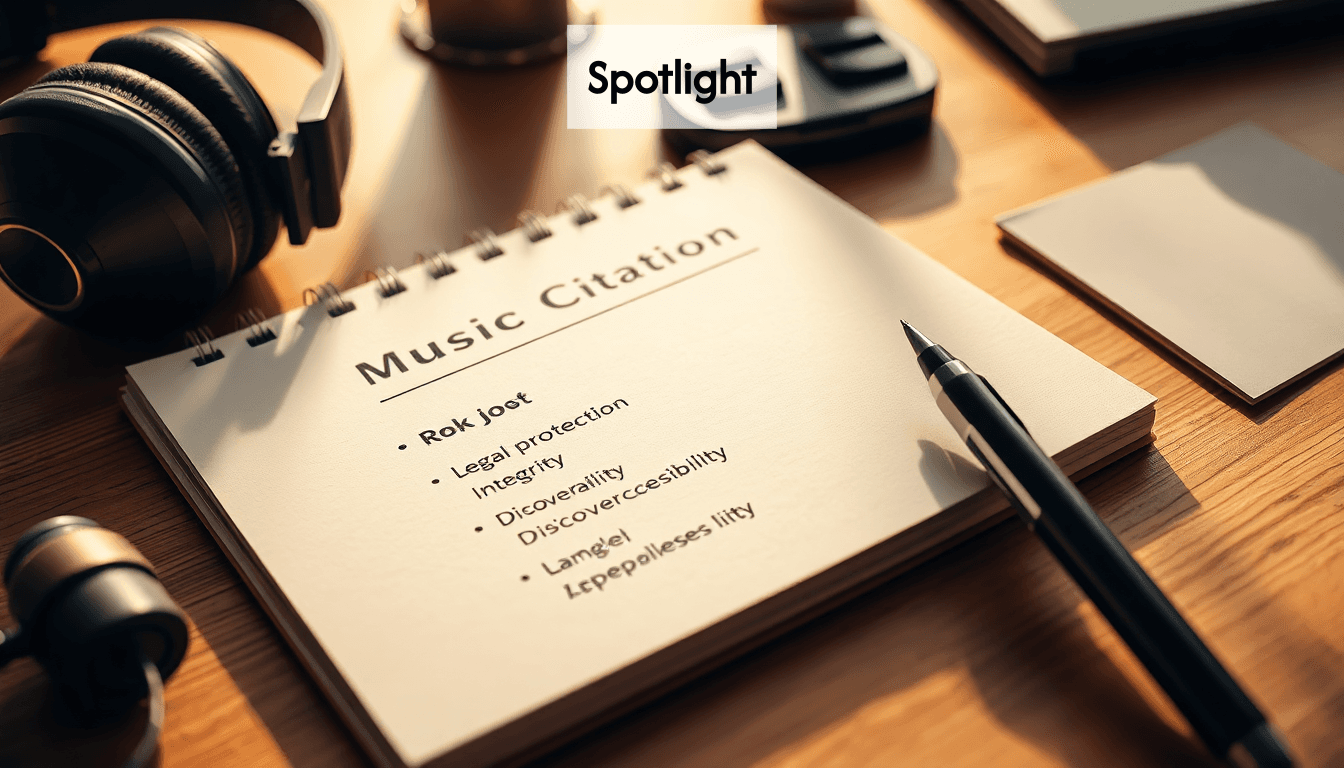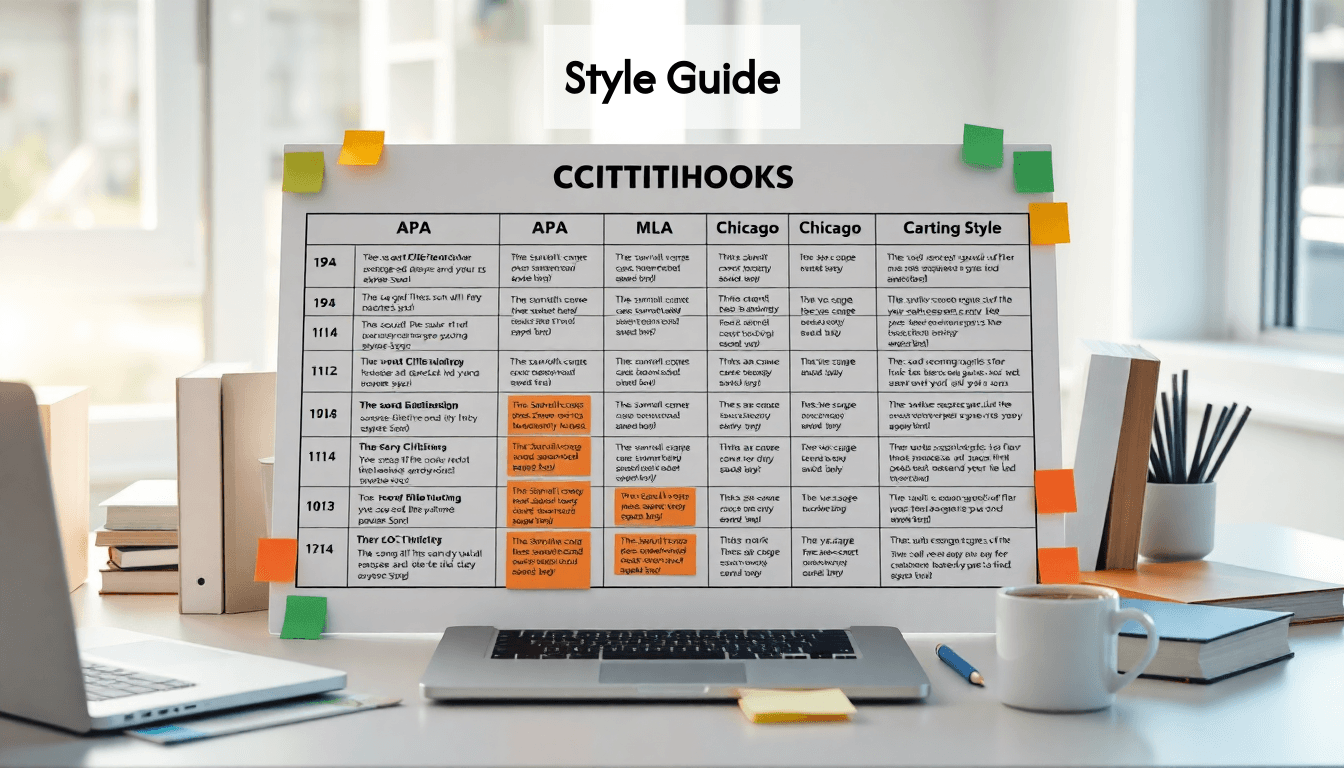Loading...

Accurate song referencing does more than satisfy academic requirements—it protects you from potential copyright infringement and gives proper credit to musical creators. When writers fail to properly cite songs, they risk unintentional plagiarism and undermine the integrity of their work.
According to a 2021 study by the Music Publishers Association, over 70% of academic papers containing song references had citation errors that could technically constitute copyright violations. These errors ranged from incorrect formatting to complete omission of essential attribution elements.
Proper citation practices matter for several compelling reasons:
Whether you're writing an academic paper, blog post, or creative work, knowing how to reference a song correctly ensures you honor both legal requirements and artistic contributions while strengthening your own credibility as a writer.

| Key Point | Details |
|---|---|
| Importance of Accurate Referencing | Proper song citations protect against copyright infringement and give credit to creators, helping maintain integrity in writing. |
| Common Citation Errors | Over 70% of academic papers suffer from errors in song referencing, which can lead to potential violations and plagiarism risks. |
| Legal and Academic Benefits | Correct citation practices bolster both legal protections and the credibility of your academic or professional work. |
| Essential Citation Elements | Include creator information, title, publication details, and access information for comprehensive song references. |

Each major citation style handles song titles differently, with specific formatting requirements for in-text citations and reference lists. Understanding these distinctions is essential for accurate music citation.
In APA format, song titles appear in quotation marks within the text, while album titles are italicized. The reference entry includes the songwriter(s), publication year, song title, and album information.
Example: Smith, J. (2020). "Midnight reflections" [Song]. On Urban echoes. Atlantic Records.
MLA requires song titles in quotation marks and album titles in italics for both in-text citations and works cited entries. The citation begins with the performer's name, followed by the song title, album, label, and year.
Example: Swift, Taylor. "All Too Well." Red (Taylor's Version), Republic Records, 2021.
Chicago offers two citation systems: notes-bibliography (common in humanities) and author-date (used in sciences).
Both systems place song titles in quotation marks and album titles in italics.
Example (Notes-Bibliography): Beyoncé, "Formation," Lemonade, Parkwood Entertainment, 2016, digital download.
Choosing the appropriate citation style depends on your discipline, publication requirements, or instructor preferences. Consistency within your document is paramount regardless of which style you select.
Properly referencing a song involves gathering specific information and formatting it according to your required citation style. Follow these steps for accurate song citations:
Gather source information – Collect all relevant details about the song: Dockerfile README.md email-templates i18n-config.ts i18nConfig.ts next-sitemap-samwell.config.js next-sitemap-semihuman.config.js next.config.js node_modules package-lock.json package.json public src svgr.d.ts translations tsconfig.json Artist/performer's full name Dockerfile README.md email-templates i18n-config.ts i18nConfig.ts next-sitemap-samwell.config.js next-sitemap-semihuman.config.js next.config.js node_modules package-lock.json package.json public src svgr.d.ts translations tsconfig.json Songwriter(s) if different from performer Dockerfile README.md email-templates i18n-config.ts i18nConfig.ts next-sitemap-samwell.config.js next-sitemap-semihuman.config.js next.config.js node_modules package-lock.json package.json public src svgr.d.ts translations tsconfig.json Song title Dockerfile README.md email-templates i18n-config.ts i18nConfig.ts next-sitemap-samwell.config.js next-sitemap-semihuman.config.js next.config.js node_modules package-lock.json package.json public src svgr.d.ts translations tsconfig.json Album title (if applicable) Dockerfile README.md email-templates i18n-config.ts i18nConfig.ts next-sitemap-samwell.config.js next-sitemap-semihuman.config.js next.config.js node_modules package-lock.json package.json public src svgr.d.ts translations tsconfig.json Record label or publisher Dockerfile README.md email-templates i18n-config.ts i18nConfig.ts next-sitemap-samwell.config.js next-sitemap-semihuman.config.js next.config.js node_modules package-lock.json package.json public src svgr.d.ts translations tsconfig.json Year of release/publication Dockerfile README.md email-templates i18n-config.ts i18nConfig.ts next-sitemap-samwell.config.js next-sitemap-semihuman.config.js next.config.js node_modules package-lock.json package.json public src svgr.d.ts translations tsconfig.json Format (digital download, CD, vinyl, streaming service) Dockerfile README.md email-templates i18n-config.ts i18nConfig.ts next-sitemap-samwell.config.js next-sitemap-semihuman.config.js next.config.js node_modules package-lock.json package.json public src svgr.d.ts translations tsconfig.json URL or DOI for online sources Dockerfile README.md email-templates i18n-config.ts i18nConfig.ts next-sitemap-samwell.config.js next-sitemap-semihuman.config.js next.config.js node_modules package-lock.json package.json public src svgr.d.ts translations tsconfig.json Access date for online sources
Determine appropriate citation style – Identify which style guide your work requires (APA, MLA, Chicago, etc.)
Format in-text citations – When mentioning the song within your text: Dockerfile README.md email-templates i18n-config.ts i18nConfig.ts next-sitemap-samwell.config.js next-sitemap-semihuman.config.js next.config.js node_modules package-lock.json package.json public src svgr.d.ts translations tsconfig.json Place song titles in quotation marks ("Imagine") Dockerfile README.md email-templates i18n-config.ts i18nConfig.ts next-sitemap-samwell.config.js next-sitemap-semihuman.config.js next.config.js node_modules package-lock.json package.json public src svgr.d.ts translations tsconfig.json Italicize album titles (Imagine) Dockerfile README.md email-templates i18n-config.ts i18nConfig.ts next-sitemap-samwell.config.js next-sitemap-semihuman.config.js next.config.js node_modules package-lock.json package.json public src svgr.d.ts translations tsconfig.json Include artist name when first mentioning the song
Create reference/works cited entry – Follow your style guide's specific format for the full citation
Double-check formatting – Verify punctuation, italicization, and quotation mark placement
For example, referencing The Beatles' "Hey Jude" in a paper might appear as: The emotional build in "Hey Jude" (1968) demonstrates McCartney's skill in crafting memorable melodies. The corresponding reference list entry would contain the complete publication information formatted according to your citation style.
Consistently applying these steps ensures your song references meet academic standards while properly crediting musical creators.
Regardless of citation style, every complete song reference should include specific elements to properly identify and credit the musical work. The following components create a comprehensive song citation:
The hierarchy of importance varies slightly between citation styles, but a comprehensive reference for Billie Eilish's "Bad Guy" would include:
| Element | Example |
|---|---|
| Primary creator | Eilish, Billie (performer); O'Connell, Finneas & Eilish, Billie (songwriters) |
| Song title | "Bad Guy" |
| Container | When We All Fall Asleep, Where Do We Go? |
| Publisher | Darkroom/Interscope Records |
| Date | 2019 |
| Format/Location | Digital track 2 |
Properly crediting collaborators is particularly important with songs that feature multiple artists or have been remixed, sampled, or covered. When referencing a specific version, such as a remix or live recording, include the distinguishing details that identify that particular rendition of the song.
Even experienced writers encounter challenges when referencing songs. Here are solutions to the most common questions about how to reference a song properly:
When artists use unconventional capitalization or symbols (like P!nk or FINNEAS), maintain the stylization in your citation while following standard punctuation rules for the citation format.
Example: Original: "thank u, next" Citation: Grande, Ariana. "thank u, next." thank u, next, Republic Records, 2019.
When a song contains samples, you may need to acknowledge both works if your discussion involves the sample. First cite the primary song, then include information about the sampled material in your text.
For non-English songs, include both the original title and an English translation in brackets if relevant to your audience:
"Despacito" ["Slowly"] demonstrates how linguistic rhythm affects musical composition.
Do you put song titles in quotation marks? Yes, song titles should appear in quotation marks in most citation styles, while album titles are italicized.
How do you cite a song without an album? For singles not released on albums, omit album information and specify "single" after the song title.
Are song titles italicized or in quotes? Song titles typically appear in quotation marks, not italics. Albums, however, are italicized.
How do you cite song lyrics? When quoting lyrics, treat them as you would any direct quotation, with proper in-text citation formatting and complete reference entry for the song.
The most common citation error is inconsistency in formatting. Always review your style guide's specific rules and apply them uniformly throughout your document.
Properly referencing a song involves including the creator's name, song title, album title, publication year, and format. Follow the specific citation style guidelines (APA, MLA, Chicago) for correct formatting.
In most citation styles, song titles should be placed in quotation marks, while album titles are italicized.
If a song is released as a single, omit the album information and specify "single" after the song title in your citation.
When a song title includes unconventional capitalization or symbols (like P!nk), maintain the original stylization in your citation while adhering to standard punctuation rules of your chosen citation style.
Navigating the intricate world of song citations can be daunting, especially when aiming for academic integrity while protecting your work from copyright violations. With over 70% of academic papers showcasing citation errors, it's clear that proper referencing holds immense importance in establishing credibility and fair use.
Imagine having a dependable partner that not only understands the nuances of song referencing but also offers a seamless solution! With Samwell.ai, your academic writing will transform:
 Craft compelling essays that honor musical creators while preserving your integrity— start your journey with Samwell.ai today! Explore the full potential of effective writing and research assistance at https://samwell.ai and conquer your assignments confidently. Don't wait—join over three million satisfied users making their academic lives easier now!
Craft compelling essays that honor musical creators while preserving your integrity— start your journey with Samwell.ai today! Explore the full potential of effective writing and research assistance at https://samwell.ai and conquer your assignments confidently. Don't wait—join over three million satisfied users making their academic lives easier now!



